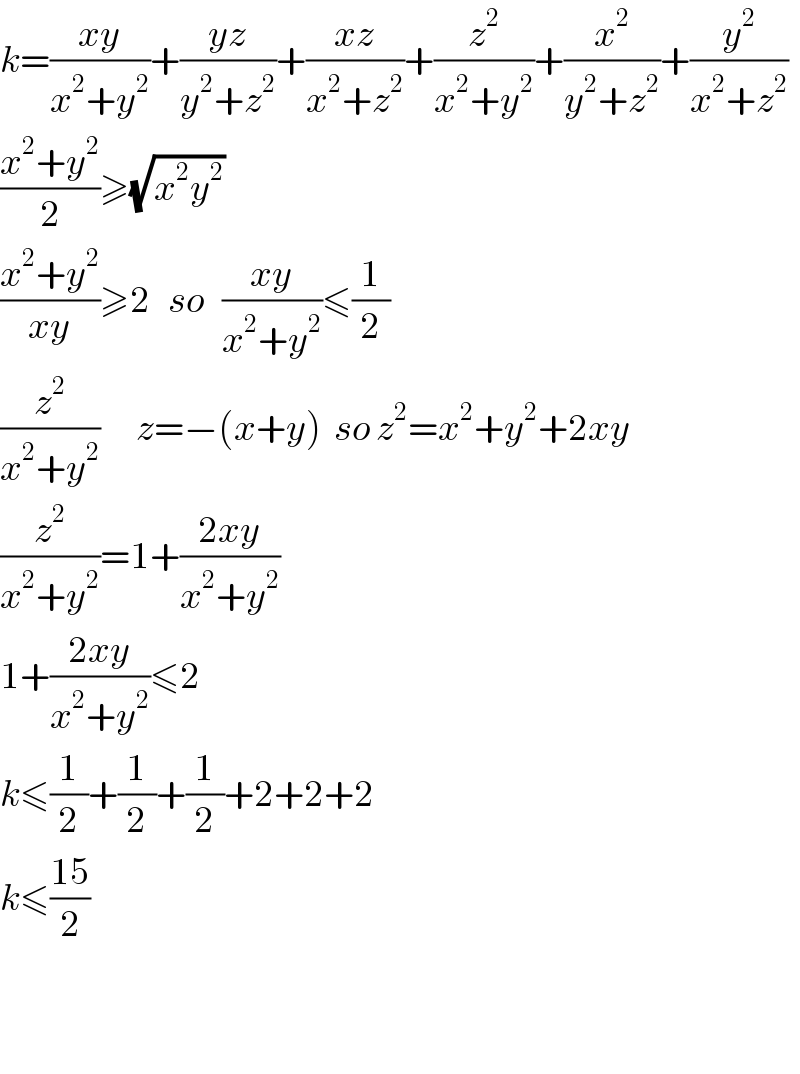
Question and Answers Forum
Question Number 40306 by behi83417@gmail.com last updated on 19/Jul/18

Commented by MJS last updated on 20/Jul/18

Commented by MJS last updated on 20/Jul/18
![f(x,y,z)=((x^2 +yz)/(y^2 +z^2 ))+((y^2 +xz)/(x^2 +z^2 ))+((z^2 +xy)/(x^2 +y^2 )) z=−(x+y) f(x,y,−(x+y))= =g(x,y)=((3(x^6 +y^6 +3xy(x^4 +y^4 )+8x^2 y^2 (x^2 +y^2 )+11x^3 y^3 ))/((x^2 +y^2 )((x+y)^2 +x^2 )((x+y)^2 +y^2 ))) (d/dx)[g(x,y)]=−((15xy^2 (2(x^8 −y^8 )+9xy(x^6 −y^6 )+16x^2 y^2 (x^4 −y^4 )+14x^3 y^3 (x^2 −y^2 )))/((x^2 +y^2 )^2 ((x+_ y)^2 +x^2 )^2 ((x+y)^2 +y^2 )^2 )) (d/dx)[g(x,y)]=0 ⇒ x=0 ∨ y=0 ∨ 2(x^8 −y^8 )+9xy(x^6 −y^6 )+16x^2 y^2 (x^4 −y^4 )+14x^3 y^3 (x^2 −y^2 )=0 x={−2y; −y; −(y/2); 0; y; −(y/2)(1+i(√3)); −(y/2)(1−i(√3))} f(x, y, z)={((21)/(10)); (3/2); ((21)/(10)); (3/2); ((21)/(10)); −6; −6} so these are the minima and maxima of f(x, y, z)](Q40359.png)
Answered by tanmay.chaudhury50@gmail.com last updated on 19/Jul/18

Answered by math1967 last updated on 19/Jul/18
![x,y,z∈R ∴(x−y)^2 ≥0 (y−z)^2 ≥0,(z−x)^2 ≥0 ∴x^2 +y^2 ≥2xy .......1 From 1 (1/(x^2 +y^2 ))≤(1/(2xy)) ((xy)/(x^2 +y^2 ))≤(1/2) ......(2) Again x+y+z=0 ⇒x^2 +y^2 +2xy=z^2 ∴x^2 +y^2 +3xy=xy+z^2 From (2) ((3xy)/(x^2 +y^2 ))≤(3/2) 1+((3xy)/(x^2 +y^2 ))≤(5/2) ((x^2 +y^2 +3xy)/(x^2 +y^2 ))≤(5/2) ((xy+z^2 )/(x^2 +y^2 ))≤(5/2) [x^2 +y^2 +3xy=xy+z^2 ] similarly ((yz+x^2 )/(y^2 +z^2 ))≤(5/2) ((zx+y^2 )/(z^2 +x^2 ))≤(5/2) ∴((xy+z^2 )/(x^2 +y^2 )) +((yz+x^2 )/(y^2 +z^2 )) +((zx+y^2 )/(z^2 +x^2 ))≤((15)/2)](Q40312.png)
